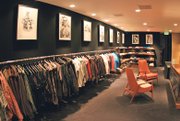L.A.'s Next Fashion Street: Fairfax?
The character of Los Angeles’ Fairfax Avenue is up for grabs, according to the businesspeople on this street, which neighbors high-profile fashion boulevards Melrose Avenue and West Third Street. However, the bets are on that Fairfax will be a thoroughfare for fashion retail.
In the past year, some of Fairfax Avenue’s traditional Jewish businesses such as Hatikvah Music International have been forced off of the street by rising rents. More than four of the businesses that have replaced them on the 400 block of North Fairfax Avenue were fashion stores or were selling fashion items.
The street is not just attracting a fashion customer. It’s attracting a customer specifically obsessed by streetwear, the casual clothes inspired by skateboarding, as well as punk and hip-hop music. New York–based skateboard boutique Supreme opened on the 400 block of North Fairfax in 2005. Likeminded fashion entrepreneurs started scouting opportunities on the street soon after.
Salvador Lucas Barbier, an ex-professional skateboarder and skatewear designer, opened his 1,600-square-foot boutique, SLB, on Fairfax in August. He opened SLB to showcase his upcoming label of the same name. Since his fashion resume included selling his garments at the Supreme boutique in New York City, he searched for a retail space similar to Supreme on Fairfax. He had hoped that a concentration of boutiques selling similar styles of fashion would attract a loyal niche of customers to the street.
Rick Klotz, one of the pioneers of Los Angeles’ streetwear scene, also happened to be looking for a retail space to showcase his fashion labels Fresh Jive and Gonz. He partnered with Fairfax Avenue bookseller Naama Givoni to sell his fashion lines at her boutique, Reserve. In June, Givoni and Klotz redesigned the 1,000-square-foot store still called Reserve, so half of the space would be devoted to Fresh Jive, and half would be devoted to Givoni’s art books and DVDs.
On Sept. 15, contemporary womenswear boutique The Elegant Mess debuted in a space that formerly housed Late Bloomer, another women’s boutique.
In a space formerly occupied by Hatikvah Music International, the boutique called Family opened Oct. 10. Along with selling literature, comic books, art and DVDs, it will sell art-designed T-shirts with price points ranging from $25 to $35 and $250 sweaters, designed by Paris-based art collective Shobo Shobo.
The sweaters and the T-shirts will be sold under the store label Family, said David Kramer, who co-owns the store with Tahli Harkham, daughter-in-law of Uri Harkham, president of Los Angeles–based fashion company Harkham Industries, Inc.
Fashion sneaker store Flight Club also debuted on the 400 block of North Fairfax earlier this year, and streetwear company Crooks & Castles will reportedly open a boutique in the neighborhood, although requests for an interview from California Apparel News went unanswered.
While Fairfax seems to be burgeoning with streetwear fashion, real estate broker Chuck Dembo didn’t think it would be the next glamorous fashion street such as Robertson Boulevard. He said the street’s retail needs some time to mature. “You’re seeing the first generation of [fashion] retail opening up there. National chains probably won’t be moving in soon,” said Dembo, partner in Beverly Hills, Calif.–based Dembo & Associates.
However, the street’s retail changed at a quick pace, said Reserve co-owner Givoni. For much of its history, apparel boutiques have kept a low profile on the 400 block of North Fairfax. People walking the street browsed and shopped at thrift stores such as Out of the Closet, or vintage-inspired fashion boutique Catwalk, while on their way to landmark restaurant Canter’s Delicatessen, or to see music and comedy at the Largo nightclub.
The street’s fashion retail grew while much of the street’s potential seemed off of the city’s radar, Givoni said. “There are other neighborhoods that are always called ’up-andcoming,’ but it never happens. The change for Fairfax is happening fast,” she said.
Commercial rents have also grown quickly. In 2005, the 1,000-square-foot space for Hatikvah cost $1,100 each month. The coowners of Family now pay more than $2,900 each month, Kramer said.
The new fashion businesses might have a tough time because the neighborhood residents have not patronized the block’s businesses in the past, said Cary Long, owner of Fairfax’s 14-year-old Nova Express Cafeacute;. “My customers are from [University of Southern California], Echo Park, Pasadena. The people who live three blocks away don’t walk here,” Long said.
The street’s consumers are often tourists from Japan and Western European countries, Kramer said. He believed that recently opened cafeacute; T On Fairfax is attracting more neighborhood residents to the street. Elegant Mess owner Alexandra Suttle said that she opened her boutique on the street because she liked the street scene of people walking their dogs and hanging out at cafes. “It has potential to be a shopping Mecca,” she said.






















